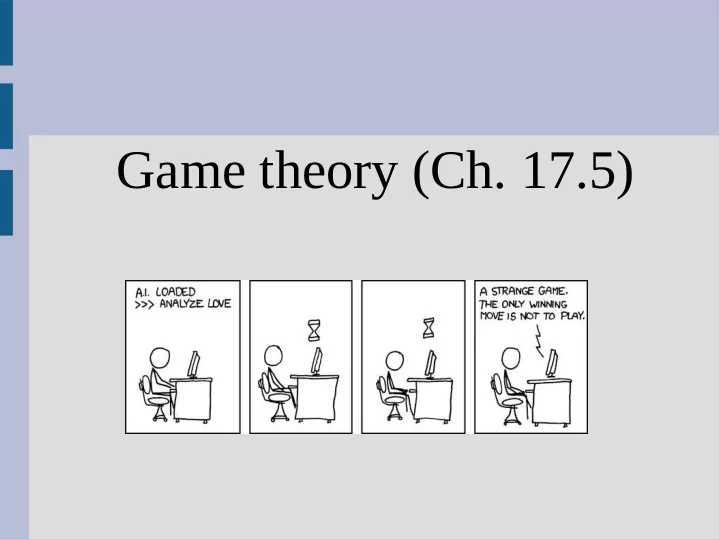

Game theory (Ch. 17.5)
Announcements Test grades up now
Find best strategy How does this compare on PD? Player 1: p = prob confess... P2 Confesses: -8*p + 0*(1-p) P2 Lies: -10*p + (-1)*(1-p) Cross at negative p, but red line is better (confess)
Chicken What is Nash for this game? What is Pareto optimum?
Chicken To find Nash, assume we (blue) play S probability p, C prob 1-p Column 1 (red=S): p*(-10) + (1-p)*(1) Column 2 (red=C): p*(-1) + (1-p)*(0) Intersection: -11*p + 1 = -p, p = 1/10 Conclusion: should always go straight 1/10 and chicken 9/10 the time
Chicken We can see that 10% straight makes the opponent not care what strategy they use: (Red numbers) 100% straight: (1/10)*(-10) + (9/10)*(1) = -0.1 100% chicken: (1/10)*(-1) + (9/10)*(0) = -0.1 50% straight: (0.5)*[(1/10)*(-10) + (9/10)*(1)] + (0.5)*[(1/10)*(-1) + (9/10)*(0)] =(0.5)*[-0.1] + (0.5)*[-0.1] = -0.1
Chicken The opponent does not care about action, but you still do (never considered our values) Your rewards, opponent 100% straight: (0.1)*(-10) + (0.9)*(-1) = -1.9 Your rewards, opponent 100% curve: (0.1)*(1) + (0.9)*(0) = 0.1 The opponent also needs to play at your value intersection to achieve Nash
Chicken Pareto optimum? All points except (-10,10) Can think about this as taking a string from the top right and bringing the it down & left Stop when string going straight left and down
Find best strategy We have two actions, so one parameter (p) and thus we look for the intersections of lines If we had 3 actions (rock-paper-scissors), we would have 2 parameters and look for the intersection of 3 planes (2D) This can generalize to any number of actions (but not a lot of fun)
Repeated games In repeated games, things are complicated For example, in the basic PD, there is no benefit to “lying” However, if you play this game multiple times, it would be beneficial to try and cooperate and stay in the [lie, lie] strategy
Repeated games One way to do this is the tit-for-tat strategy: 1. Play a cooperative move first turn 2. Play the type of move the opponent last played every turn after (i.e. answer competitive moves with a competitive one) This ensure that no strategy can “take advantage” of this and it is able to reach cooperative outcomes
Repeated games Two “hard” topics (if you are interested) are: 1. We have been talking about how to find best responses, but it is very hard to take advantage if an opponent is playing a sub-optimal strategy 2. How to “learn” or “convince” the opponent to play cooperatively if there is an option that benefits both (yet dominated)
Repeated games http://ncase.me/trust/
Recommend
More recommend